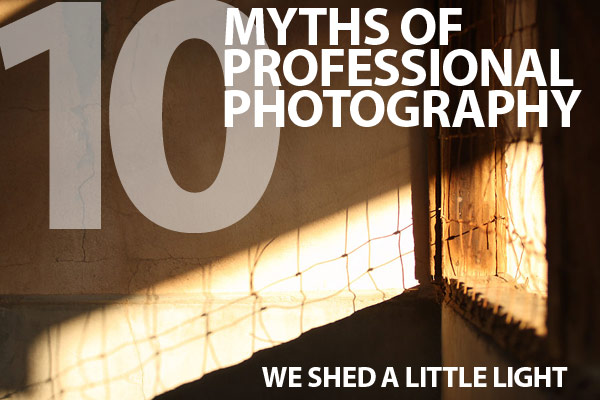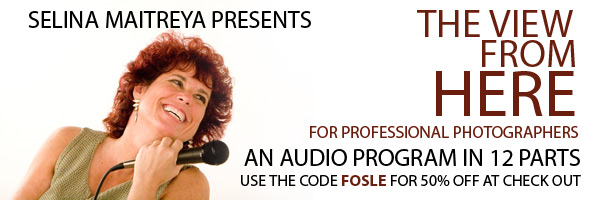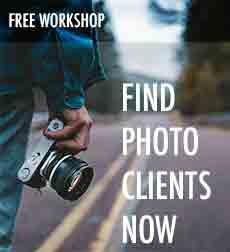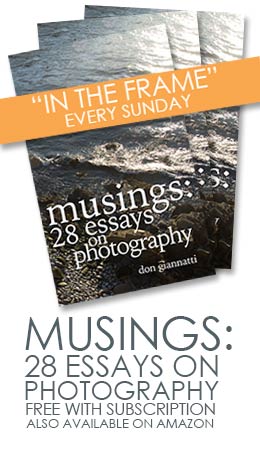
Err… at least the 10 that I hear a lot of chatting about. I get questions about these at nearly every workshop. So a quick post on what some folks think is reality and what IS reality. Yeah, I know… you saw it on the interwebs. Shoots with all the latest and greatest gear, a few dozen ‘assistants’ there to move stuff to the photographers every whim, lavish lunch spreads, incredibly exciting atmosphere with the thrill of not having to bust ass for ‘the man’.
Sure. Yeah, that’s the way it always is. Except when, you know, it’s not.
Before we start down that path, there are a few posts out there in the interwebs I want to make sure you see:
– Smashing Magazine had a great post on excellent product photography (thanks guys!).
– “Flashing the Middle Finger to the Dreaded Middle” by Bruce DeBoer.
– Kirk Tuck’s wonderful article on street shooting. Worth the read, so do it.
– Seth has something to say about hiring professionals – and amateurs that can meet the level of professionalism.
– And if you are not aware of what is in store for us photographers, take a look at this via A Photo Editor.
Now on to some myths that get related to me often at the workshops. If you have any you would like to bust as well, add them in the comments and I will make another post.
1. Professionals all have the best, most modern gear:
Well… no, not really. Some do, and many have top-of-the-line stuff mixed with old stand-by’s. And some only replace when needed. And most have what they have and it still works and they keep it working as long as possible.
My suite-mate Ken Howie still shoots the original Leaf back on his view cameras. 6MP backs… and he has a stash of them from EBay and anywhere he can find them. They are cooled by refrigeration units when shooting and all of them are about 20 years old… so having a stash of usable backs is important. His first one cost about $35K, and he is getting them off of EBay for around $300 in working condition these days.
But the point is – they work. Beautifully.
His clients are some of the most demanding; advertising agencies, art museums, and custom automotive. He has 30″ x 60″ prints in the lobby that are amazing. He knows his craft and delivers a wonderful product. From a 20 year old back. He also owns a fill 1DSMKIII system as well, because there are times when he needs that format. He has what he needs, not simply for the ‘new’ factor.
Of all the working shooters I know, most have a mix of good gear and ‘it works’ gear. Clients don’t really care if your stands are a bit older, or whether you have the newest and greatest softbox. The images don’t care if you use a $600 photo scrim or a $12 Shower curtain – as long as the image rocks, it’s all good.
I recently spoke with an editorial portraitist who has 2 bodies, 2 lenses and a small portable lighting kit (all total less than $15K) and he is working pretty regularly. His style of image doesn’t require that much stuff. And his clients love his work, not his gear.
Get what you need. Make sure it works. Shoot more pictures.
2. Professional photographers need lots of staff.
Well, that looks cool on video doesn’t it? Whole gaggles of 20 somethings running around and being ‘involved.’ And I am sure that situation plays itself out in many studios. But in most, there are the minimal staff needed to create the work. I know many shooters who rarely use assistants unless they really need the help. Carrying 20 packs of gear up three floors is a gonna trip getting an assistant for me… heh. And there is nothing better than working with a great assistant when the shoot calls for having a second pair of hands and eyes.
Working outside with umbrellas and softboxes when there is a breeze can be quite a challenge, for sure. So great folks willing to help hold stands can be a blessing.
However, in most working studios staff is rare. Staff is expensive. And if you aren’t making the money you need, paying staff for sitting around can be a drain of resources. Be judicious when you hire – make sure you need and will be able to use them. Be fair to them, as well as yourself.
For me, freelance assistants are the way to go. And when you need them, they are worth every dollar. So get to know who they are so you can find them when you need them. For most of us though, working alone is probably the reality for most of our gigs.
Recent posts:
10 Website Strategies for Photographers
10 More Website Strategies for Photographers
Five Things To Do To Land Assignment Photography
3. Every shot is portfolio worthy.
Yeah. Heh.
Actually most of the work is not portfolio quality for most of us. They are work-a-day shots of people, places and things that are used for commerce and for illustration.
A six day shoot of garage opener doors and parts for a catalog may be a real kick to the bottom line that month, but probably not gonna be stuff you share in your portfolio -with the possible exception of trying to get another catalog of garage door openers… and then, only if asked.
Commercial photographers do a lot of commercial gigs that are not going to ultimately end up in the portfolio. It is simply a part of what we do. A big part.
Most shooters in smaller to mid markets are going to find it that way. The portfolio work is much harder to come by as you start to build your careers. And choose those pieces carefully.
4. Too much competition:
Well, if there is that much competition, there must be work to go after.
I cannot think of a single endeavor worth doing that doesn’t have competition. Can you? Why would I want to do something that no one else has proven they can make a living doing? (Of course there are entrepreneurs who do that all the time, but we are talking photographers here.)
You want competition? Try being a bank president. Or a top attorney. Or a prize winning jockey. Now there is competition. There are very damn few of them… there are lots of photographers. That’s a good thing.
And with the internet I can see what they do. And make my stuff better.
Hard to make your stuff better than the other guys? Hell yeah, it is. Did you expect it to be easy? Really?
Sorry. It isn’t easy, it is simply what you have to do.
5. Too expensive:
Nope. It isn’t.
You can start a photographers business on less than $15K. And you can make it thrive.
Tell me any other businesses that can be started up for under $20K and see revenues in mid 5 figures in a year or two.
You think cameras are expensive, check out what a pizza oven goes for. Those mom & pop pizza places have a hell of a lot of money in those pizza ovens.
Stop telling yourself that it is too expensive and get your work out there.
6. It’s shooting every day:
Oh, sure it is.
Except for those days when you are editing, packing, unpacking, traveling, scouting, marketing, cold-calling, marketing, working on the portfolio, gathering receipts, marketing, making bids, filling out RFP’s, marketing, going to meetings, returning calls and emails and marketing.
Yeah, except for when you are doing that stuff, it’s shooting every day. Yep.
7. Your art will ultimately win out.
If you are really, REALLY good, you don’t have to market your self. The work will speak for itself and the phone will ring.
Sure.
Good luck with that.
8. You can get rich.
A. If you got into photography to get rich, you should quickly get used to disappointment.
B. If you do manage to get rich (and there are most definitely some very rich photographers) try to manage your money and stay rich.
C. But most of us will not. Just the way it is.
9. Working for yourself is a blast.
Except for of course the boss. He/She is a slave driver who will make you work instead of watching the game, fooling around on Facebook, hanging out with the guys, having a weekend without work… I could go on and on, but you get the point.
Being self employed has a lot of perks. It is also one of the most demanding endeavors you will ever take on. It takes discipline, self motivation, perseverance and sheer guts to do it. You are the only one that can make the decision whether it is right for you. But please be sure you take a very strong self-audit to find out if you are ready for the challenge.
10. You never shoot “for free”:
Yes. You do.
On occasion.
Anyone who says they haven’t or don’t are not being straight or parsing the terms.
There are times when the gift of photography, the goodwill of images, the ability to help a friend who can in turn then help you is too compelling. Just be sure you know what you are doing and what will come of it.
Be judicious, be careful and be aware that you MAY be getting taken advantage of… but you can take advantage of situations yourself.
Thanks for coming along on this little rant. I hope that I may have helped to put a hole in some of these “myths” or whatever you would refer to them as being.
—
 |
 |
 |
Follow me on Twitter, visit the Learn to Light Workshop page for information on the workshops, and have a great shoot this week.






Wow. Another amazing and honest post. I appreciate that I can count on you for that. The pool of posts like this is quite small so at least I know where to come for the truth and suggestions. I appreciate what you do probably more than you know.
Again, great post.
Being a photographer is glamorous: Yeah, nobody ever pays attention to the sweat you make hauling gear up and down stairs, or in my case trails, to get that perfect shot on the mountain overlooking the lake, rivers and mountains in the distance. As soon as the shots are done, you leave and don’t see what is involved with tearing everything down and packing it up. then the real work begins, backing up your files boht onsite and offsite, then editing, proofing, sending samples, more editing then finally delivering prints. It all seems so glamorous to the non-photographer.. is probably because we wear such cool shirts.. 🙂
I used to work in the professional photo lab business, working with professional photographers of course! I appreciate your list and being a “Professional Photographer” myself for the last 6 years have witnessed the ups and downs in the industry. It brings to mind my favorite quote from my boss in the photo lab business who said, “You know how to make a million bucks in the photo lab business? Start with two million . . .”
Keep up the good work Don! I always appreciate your guidance, advice and most of all, your humor.
nice job you are right on – thanks
10 for 10, Don! Great rant.
Something I would like to add about #5 and #8 – most photographers that are thinking about leaving their day job need to remember that medical insurance is more expensive, your employer won’t match your 401k, there are no paid vacations or sick days, short-term and long-term disability insurance is more expensive than at your old job, you have to budget for marketing, incidental expenses will cut into your bottom line until you get a real handle on those costs… and if you don’t incorporate and pay into state unemployment insurance – when you hit a lean time, you’re on your own. You can’t collect.
Yes, it’s cheaper than a lot of other businesses, but it’s a whole lot more expensive than working for someone else.
#11: Your family and friends will understand what you do.
You might as well be a dog food tester (actual real job). Folks can relate to wedding photographers (or think you are one). But what commercial photographers actually do is not well understood. Unless you shoot a big bill board in your own town, they will look at you funny.
Don, don’t forget: “You get to write off everything you spend”.
You get to travel the world. First class.
Of course the photographer always ends up romantically involved with the hottest models.
All commercial photography is action sports and extreme models.
Even the smallest headshot assignment calls for an assistant and a stylist and a MUA…..
Photographers have to own whatever gear the clients might ask for.
You’ll always have tons of spare time.
All those guys selling DVD’s are so busy working it’s unbelievable. The way to being a hot advertising photographer is to have a hot DVD on lighting with small flashes.
Corona gives cool photographers unlimited free beer in exchange for frequent mentions…
Yep to all.
Just don’t go around telling everyone about that last thing… “Corona gives cool photographers unlimited free beer in exchange for frequent mentions…”
That was a deal done a long time ago, and well, I … err…
I’ve said too much.
That was a nice bit of reading!
I knew most of that of course but seeing it said like that is a good thing.
I do not at this time make my money with photography, but I have had my own business and you can make a list like that for about every profession there is.
Try explaining to eager young hipsters that having your own bike messenger company basicaly means doing marketing, the books and chasing people that won’t pay. And riding your bike when nobody else wants to (in the rain…..)
As someone who has had the chance to see the inner workings of many small businesses, this has to be one of the most fair, balanced, and realistic articles on running your own business that I’ve ever read. This article is gold, and I’m going to do my part to spread it around.
Good stuff Don. Help me out with this one; It isn’t a myth, more of a curse. I decided to become a pro because I love what I do and there are people out there who will pay for what it. But I’m not yet as busy as I need to be. The “curse” is that sometimes I will offer to shoot people who interest me purely because I need to shoot and they interest me. I do get some PR from this as they often rave to their friends and that has led to other paid work. But it would be much better if I could find a way to approach people who interest me and get paid for it.
I can understand the need to get paid for the work, but I still make photographs for me. Sounds like you do as well.
Possibly satisfy both by finding a reason to shoot the people you want to shoot with a larger ‘project’ in mind – or a specific portfolio or set of images. Then use that set of images to drive more PR and interest in the other parts of your work.
However, if one ‘free’ can lead to two ‘paid’ – for now, that is a win-win.
Keep it up, and never never never give up.
I read dozens of blogs in an RSS reader. But when I get to your blog and it looks like a rant I open your blog to read the post properly. I love the healthy dose of reality that you impart. Thanks for these posts. Great stuff.
On number 10. Definitely be selective when giving your services for free, but if you feel you can get something out of the project for yourself, do it. As you go along in your career, it becomes easier to see if a freebie has value for you. Sometimes, on rare occasions, these are the jobs that give you portfolio pieces (see no. 3).
Thanks for a great post. Cheers.
http://www.guessthelighting.com
Amen.
I have been shooting all my adult life. There have been good days, weeks and months. The inverse is true, too. But for the most part, the good wins out. Even the worst of days beats the grueling life that many people face every day. Imagine life under the draining color of fluorescent lights all day, every day.
I have seen things and been places unimaginable because of my camera. It is an amazing passport. We who do this for a living are blessed.
Nothing beats being your own boss!
It does take a certain level of self control/discipline.
I managed to start my web desing/ photography business with a £300 laptop and a 40D with a 50mm lens. Been afloat 2 years now and haven’t upgraded much at all! £0 Advertising – 100% leg work!
SD
Regarding No. 10…Sometimes shooting for free leads to the kinds of images that, well, can effect your No. 3. As you get more experienced you’ll get a feel what can benefit you and what won’t.
Cheers,
GuessTheLighting.com
Great read. Very useful and honest information. I spend just as much time, if not more, printing envelopes and DVDs, going to the post office to send things off, commuting to the shoot location, not to mention logging receipts etc. than what I spend on an actual ‘pro’ shoot.
There’s a pro who lives nearby whose only ‘pro’ digital camera is a Canon 40D. He’s made a living from photography for around 30 years and seems to be doing quite well. He has his own unique style (don’t we all?) but spends most of the working week shooting for catalogues. He does his personal work at night.
Thank you. Very well explained and makes it more accessible… it seems. I appreciate the information you are sharing- and you make good points about so many details, like equipment, budget etc, that- well you can do a lot even if you don’t have the best and the most.
I feel a little bit reassured- thank you.
So true. I think if some people had read this list before becoming a photographer, they may have reconsidered. It is not all fun and games, it is a business that requires a huge amount of effort and good business sense. But if you love it, then it is worth the effort.
Entertaining post with nice shot of reality! I particularly agree with point 1; the latest and greatest gear can’t usually be justified on a cost/benefit analysis for most workaday shooters.
Great tips and very true statements in this article. Thanks for sharing.
Hm. If you would, define “rich” for, say, a market like Chicago.